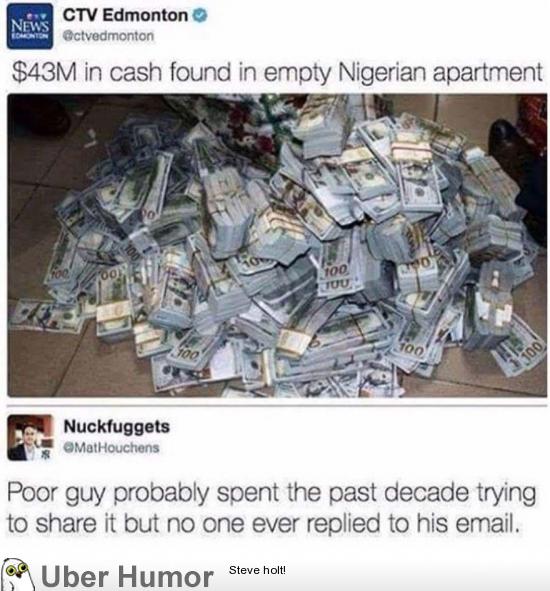The "Prince of Nigeria" meme has taken the internet by storm, becoming a cultural phenomenon that continues to captivate audiences worldwide. Originating from a series of email scams, this meme has evolved into a symbol of internet humor and satire. Understanding its roots and impact is essential to appreciate its significance in modern online culture.
While the Prince of Nigeria meme might seem like harmless fun, its origins lie in a darker history of fraud and deception. For decades, scammers have used the guise of Nigerian princes to trick unsuspecting victims into sending money. This article will delve into the origins, evolution, and cultural significance of the meme, providing valuable insights for readers.
By exploring the historical context, psychological aspects, and societal implications of the Prince of Nigeria meme, we aim to provide a comprehensive understanding of this internet staple. Whether you're a casual observer or a seasoned internet user, this article promises to deliver valuable information and entertainment.
Read also:Sydney Brown Simpson The Rise Of A Prominent Figure In Contemporary Media
Table of Contents
- The Origin of the Prince of Nigeria Scam
- Biography of the "Prince"
- How the Meme Evolved
- The Impact on Internet Culture
- Psychology Behind the Scam
- Legal Implications and Countermeasures
- Variations of the Prince of Nigeria Meme
- Statistical Insights
- Controversy Surrounding the Meme
- The Future of the Prince of Nigeria Meme
The Origin of the Prince of Nigeria Scam
The Prince of Nigeria scam, also known as the "419 scam" (named after the section of Nigeria's criminal code that prohibits fraud), dates back to the late 20th century. Initially, these scams were conducted via postal mail, but with the advent of the internet, they transitioned to email, reaching a global audience.
The scam typically involves a sender claiming to be a Nigerian prince or government official who needs help transferring a large sum of money out of the country. In exchange for assistance, the victim is promised a substantial portion of the funds. However, the scammer demands upfront fees for legal or administrative purposes, which are pocketed once received.
This fraudulent scheme has been so pervasive that it has become synonymous with internet scams. Its success can be attributed to its simplicity and the psychological manipulation employed by scammers.
Biography of the "Prince"
While the "Prince" in these scams is fictional, the persona has been crafted to evoke sympathy and trust. Below is a fictionalized representation of the "Prince" based on common elements found in these emails:
| Name | Prince Michael Adebowale |
|---|---|
| Country | Nigeria |
| Position | Exiled Royal Family Member |
| Claim | In possession of $25 million in unclaimed funds |
| Objective | To transfer funds with the help of a trustworthy individual |
These details are consistent across many scam emails, creating a recognizable pattern that has been parodied in memes.
How the Meme Evolved
The Prince of Nigeria meme began as a satirical response to the widespread scam emails. Internet users quickly recognized the absurdity of the claims and began mocking them through humor. Over time, the meme evolved, incorporating various forms of media such as images, videos, and even songs.
Read also:Anjali Arora M The Rising Star In The Entertainment Industry
Some popular iterations include:
- Photoshopped images of "Nigerian princes" with exaggerated regalia.
- Parody emails written in a humorous tone.
- Video skits featuring actors playing the role of the prince.
This evolution highlights the creativity and adaptability of internet culture in addressing societal issues.
The Impact on Internet Culture
The Prince of Nigeria meme has left a lasting impact on internet culture. It serves as a reminder of the dangers of online fraud while simultaneously providing entertainment. The meme has been referenced in popular media, including TV shows, movies, and music, further cementing its place in popular culture.
Moreover, the meme has raised awareness about the importance of digital literacy and vigilance against scams. By laughing at the absurdity of these schemes, people are more likely to recognize and avoid them in real life.
Psychology Behind the Scam
The success of the Prince of Nigeria scam can be attributed to psychological tactics employed by scammers. These include:
- Appeal to Greed: Promising large sums of money to entice victims.
- Urgency: Creating a sense of urgency to bypass rational thinking.
- Social Proof: Claiming that others have already benefited from the scheme.
Understanding these tactics can help individuals recognize and resist similar scams in the future.
Legal Implications and Countermeasures
While the Prince of Nigeria scam originated in Nigeria, its global reach necessitates international cooperation to combat it. Authorities in Nigeria and other countries have implemented measures to prosecute scammers and educate the public about these schemes.
Some effective countermeasures include:
- Public awareness campaigns.
- Improved cybersecurity measures.
- Collaboration between law enforcement agencies worldwide.
These efforts have led to the arrest and prosecution of numerous scammers, deterring others from engaging in similar activities.
Variations of the Prince of Nigeria Meme
As the internet continues to evolve, so do the variations of the Prince of Nigeria meme. Modern iterations often incorporate current events and pop culture references, keeping the meme relevant and engaging.
For example:
- Parodies of cryptocurrency scams.
- Political satire involving fictional princes.
- Interactive games and quizzes based on the meme.
These variations demonstrate the meme's adaptability and enduring appeal.
Statistical Insights
According to a report by the FBI's Internet Crime Complaint Center (IC3), losses from business email compromise (BEC) scams, including those similar to the Prince of Nigeria scam, amounted to over $1.8 billion in 2020 alone. These figures underscore the importance of addressing such scams through education and legislation.
Source: FBI IC3
Controversy Surrounding the Meme
While the Prince of Nigeria meme is widely regarded as humorous, it has also sparked controversy. Critics argue that the meme perpetuates negative stereotypes about Nigeria and its people, potentially harming the country's reputation on a global scale.
Proponents of the meme counter that it serves as a form of satire, highlighting the absurdity of the scam rather than targeting Nigerians specifically. The debate continues, reflecting broader discussions about cultural sensitivity and representation in media.
The Future of the Prince of Nigeria Meme
As internet culture continues to evolve, the Prince of Nigeria meme is likely to persist, albeit in new and innovative forms. With the rise of social media platforms and digital content creation tools, the meme's reach and influence will only expand.
However, it is crucial to approach the meme with a critical eye, ensuring that it serves as a tool for education and awareness rather than perpetuating harmful stereotypes.
Conclusion
The Prince of Nigeria meme has become a cornerstone of internet culture, providing both entertainment and valuable lessons about online safety. By understanding its origins, evolution, and impact, we can better appreciate its significance in shaping modern digital society.
We invite you to share your thoughts on this article in the comments section below. Additionally, consider exploring other articles on our site for more insights into internet culture and beyond. Together, we can foster a safer and more informed online community.


